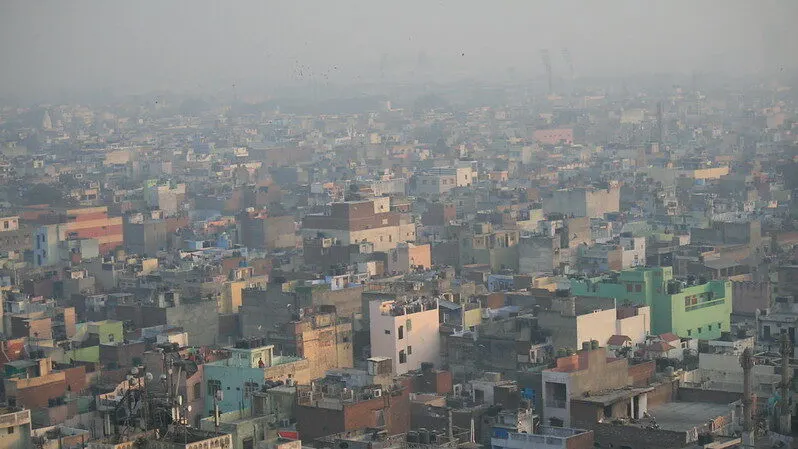Table of Content
▲
Gurugram-based real estate developer Signature Global (India) Ltd has announced a strategic partnership with WRI India to conduct a pilot study to reduce air pollution in construction projects. This initiative reflects the company’s commitment to sustainability and cleaner construction practices in the National Capital Region (NCR), where air quality remains a pressing concern. The collaboration aims to showcase how data-driven solutions and effective dust mitigation can create healthier living environments while setting benchmarks for the real estate industry.
About the Partnership
On September 29, Signature Global confirmed its collaboration with WRI India under the India Alliance for Clean Construction, a coalition dedicated to mainstreaming sustainable practices in the real estate sector. Through this joint effort, the focus will be on reducing dust emissions at construction sites, an issue that significantly contributes to poor air quality in urban areas. The initiative emphasizes practical, scalable solutions that developers can adopt, highlighting Signature Global’s proactive role in driving positive environmental change.
Also Read: Indian REITs Association partners with Global REIT Alliance to grow REITs
Ongoing Dust Mitigation Efforts
Before this new initiative, Signature Global had already taken several steps to control construction-related emissions. These include:
- Air quality monitoring sensors installed at project sites to track pollution levels.
- Periodic sprinkling of water to control dust from construction activities.
- Covering of raw materials like cement and sand to reduce particulate spread.
- Training and capacity building of site staff to ensure compliance with dust control measures.
By adopting these strategies, the developer has positioned itself as an industry leader in responsible construction practices, reinforcing its vision of building homes while safeguarding the environment.
The Pilot Study at Signature Global Daxin
The pilot study to reduce air pollution will be carried out at the Signature Global Daxin project. Low-cost sensors will be deployed at the site to measure the effectiveness of different dust mitigation techniques. These sensors will help capture real-time data, offering insights into which measures are most impactful in lowering particulate emissions.
The study will also assess how such sensor-based approaches can be integrated into day-to-day decision-making at construction sites. By combining technology with sustainability, the pilot aims to create a data-driven framework for cleaner real estate development.
Leadership Insights
Commenting on the initiative, Lalit Kumar Aggarwal, Co-founder and Vice Chairman of Signature Global, said:
“Through this partnership with WRI India, we aim to demonstrate how data-driven approaches can make dust mitigation more effective and scalable. This pilot at Daxin will not only enhance on-ground practices but also inspire the broader real estate industry and inform policy measures for cleaner, healthier construction practices.”
His statement underscores the company’s vision of making sustainability an industry-wide goal, not just an individual effort. WRI India, on its part, will contribute research-backed expertise to help design and evaluate innovative solutions that can be replicated across India’s real estate sector.
Broader Context – Air Pollution & Construction
Air pollution remains one of the biggest challenges in India, particularly in NCR. Construction activities are among the largest contributors to particulate matter emissions, especially PM10 and PM2.5 levels. These fine particles not only degrade ambient air quality but also pose serious health risks to construction workers and residents living near project sites.
The lack of effective monitoring and enforcement has often led to unchecked dust emissions. This makes the pilot study to reduce air pollution a timely intervention, with the potential to bridge the gap between policy intentions and ground-level implementation.
Also Read: Bengaluru Housing Update: OC Waiver for Buildings on Plots Above 1,200 sq ft
Significance of the Pilot Study
This collaboration is significant for several reasons:
- Actionable Insights: The pilot will generate real-world data on the impact of dust mitigation techniques.
- Policy Support: Findings can inform government guidelines and help frame stronger policies for cleaner construction.
- Industry Model: Success at Signature Global Daxin can act as a blueprint for other real estate developers.
- Healthier Cities: By reducing particulate matter, the initiative contributes to better air quality, healthier communities, and sustainable growth in urban areas.
The pilot study to reduce air pollution is not just about testing techniques it’s about transforming how the construction industry approaches environmental responsibility.
Conclusion
Signature Global’s partnership with WRI India represents a forward-looking step toward sustainable real estate practices. By launching a pilot study to reduce air pollution, the company is not only addressing immediate environmental challenges but also paving the way for an industry-wide shift toward cleaner, healthier construction.
As NCR continues to grapple with air pollution, initiatives like this demonstrate how builders can play a pivotal role in creating solutions. If successful, the study could inspire widespread adoption of dust mitigation strategies, making Indian cities more livable while aligning real estate growth with sustainability.



_1771224636.webp)



Ans 1. The partnership aims to reduce air pollution caused by construction activities in the National Capital Region (NCR) through a pilot study at the Signature Global Daxin project. The initiative focuses on data-driven solutions to mitigate dust emissions, enhance sustainability, and create healthier urban living environments.
Ans 2. Construction activities contribute significantly to particulate matter emissions, including PM10 and PM2.5. These fine particles degrade ambient air quality and pose health risks to workers and residents near construction sites. NCR, being a densely populated and rapidly developing region, is particularly vulnerable to such pollution.
Ans 3. The pilot study will deploy low-cost sensors at the construction site to measure dust and particulate levels in real time. Different dust mitigation techniques will be tested, and the data collected will help determine which methods are most effective. The goal is to create a replicable, data-driven approach to cleaner construction practices.
Ans 4. Prior measures include installing air quality monitoring sensors at sites, sprinkling water periodically to control dust, covering construction materials like cement and sand, and training site staff to follow dust mitigation protocols. These efforts position the company as a leader in sustainable construction.
Ans 5. WRI India will provide research-backed expertise, helping design, evaluate, and optimize dust mitigation techniques. Their role ensures that the study produces scientifically valid and actionable insights that can influence both industry practices and policy guidelines.
Ans 6. The pilot study is expected to generate actionable data on effective dust control measures, inform government policies, provide a blueprint for other developers, and contribute to healthier cities by lowering particulate matter levels around construction sites.
Ans 7. Yes, if successful, the initiative can serve as a model for developers across India, promoting scalable and sustainable dust mitigation practices and encouraging a shift toward environmentally responsible construction.
Ans 8. The pilot demonstrates the company’s commitment to integrating environmental responsibility into its projects. By using technology and data to address air pollution, Signature Global is positioning sustainability as a core aspect of its business practices.
Ans 9. The findings from the pilot can inform policymakers about effective dust mitigation strategies, potentially leading to stronger regulations and guidelines for cleaner construction practices in urban areas.
Ans 10. Reducing dust and particulate emissions improves air quality, reduces health risks, and creates safer, more livable neighborhoods. This benefits not only construction workers but also families living close to urban development projects.